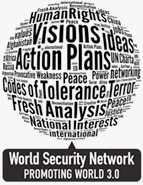The Christian Message of Peace, Reconciliation and Tolerance

Power politics is merely the occasional, and unfortunately necessary, supplement of this peace policy when it serves to protect human rights and human dignity and to check the powers of evil."
- Theses of the Working group Christian Peace Policy, Reconciliation and Tolerance of the World Security Network Foundation -
Only a genuine reconciliation policy between societies can bring about a true and lasting peace and lay the foundations of eternal peace between former enemies.
Power politics is merely the occasional, and unfortunately necessary, supplement of this peace policy when it serves to protect human rights and human dignity and to check the powers of evil.
Pure power politics in and of itself never suffices: its effect is too brief and urgently requires a “thinking heart” and a “loving intelligence” so that it can lead human beings to a better, more peaceful future in their innermost being and to peace with one’s enemies.
We must strengthen the voice of the Christianity’s central message of peace, which is so important today and to advance it actively in all countries, cultures and religions. Only then will the deep-seated roots of terrorism, war and displacement be removed and true peace—with less hatred and less—violence be created.
Christian peace politics means:
We must come to see our enemy as a fellow human with his own dignity and view him as our neighbor, approaching him with an open heart with a recognizable, genuine will for reconciliation and a new beginning.
True peace between people can only come about through an active reconciliation policy, that cracks open the encrusted shell of ideology built up over years, slowly melting away traditional prejudices and at last putting an end to tragic animosities.
Even simple coexistence next to each other without friendliness and sympathy is not sufficient, but must be replaced by a friendly, active cooperation.
We must retrieve the human soul from the depths of hostile thinking, thereby healing and liberating it.
Prejudices and hostile systems of thought must be broken.
We must pardon and forgive. Only then will we be able to achieve justice and peace.
Justice needs a heart and a soul. We do not have to forget what has happened, but forgive and seek out a new approach of peaceful coexistence. In this way, we also free ourselves when we put an end to the circle of hatred, enmity and war.
We grant the former enemy a chance to discover in himself strengths that he was up to now unaware of, so that he can become a better and more peaceful fellow man, so that from his own initiative he can develop from an enemy into a friend.
We should not merely tolerate others, rather we should accept others with all their differences.
In our colorful world of 6.5 billion individuals, and very different ideas and cultures, we must learn to practice mutual tolerance with a “thinking heart.”
Nobody is an enemy only because he is different.
The elite in all countries of this earth must propagate tolerance in their societies.
We need a new global system of responsibility extending far beyond individual boundaries and cultures for more freedom and peace, tolerance and respect.
Every human being needs tolerance in our global village.
As Christians, Muslims, Jews, Buddhists or Hindus we must leave hatred and ideology behind us and together give our world more tolerance and reconciliation and thereby kindness.
We can learn from the teachings of Augustine and the wisdom of Thomas Aquinas and Erasmus of Rotterdam regarding the tolerantia pacifica and the never easy tolerance history of Europe.
Through generosity and support, we should open the hearts of yesterday’s enemy today.
Patriotism and even devout Islam are products of love and not hate.
Pure nationalism and totalitarianism in politics and religion are, however, inhuman and always lead to hatred, aggression and ultimately to war, both internally and externally.
Ethnic cleansing and the resulting displacement are sins against humanity, no matter how they are justified.
The people have a right to their homeland—displacement uproots them.
And terrorism is also a fruit of totalitarian exaggeration and blind ideology.
The illuminating concept of Christian love must now counteract the shadow of hatred—worldwide and on all levels—Christian love must check and banish it.
We must actively construct a firebreak of love and reconciliation between the predominant majority of peaceable people and the numerically insignificant ideological arsonists and their terrorist tools.
Their containment through means of force and international law is morally justifiable and necessary because only then can the expansion of further hatred and the poisoning of human interaction be prevented.
Why is it that all conflicts and wars have precise plans for military power and commitment, however, almost never have plans for the reconciliation of the enemy societies?
Doesn’t our established international foreign and peace policy engage far too little? Isn’t it therefore doomed to failure, as it passes unnoticed by the deep human spirit of peace due to its lack of the heart and soul of reconciliation?
Why do we not transfer the positive recognitions of the successful reconciliation of former, age-old enemies—for example, the reconciliation of Germany with its contemporary friends and partners France and Poland—onto the areas of conflict of today, for example, in Palestine, Sudan, Congo, the Balkans, the Caucasus, Korea, Iraq, or Pakistan and India?
In particular, we must instill a Christian peace policy during the upbringing of our children. Upbringing in hatred should be replaced in all countries of this world by an upbringing in reconciliation. The use of children and adolescents as soldiers or suicide bombers illustrates the deep fall of the ideologies behind them and must be condemned in the harshest terms by all responsible parties.
The media in our global information society bears a special responsibility which they can not escape from with regard to superficial entertainment or achieving the highest possible audience ratings and greater profits. They must no longer serve only as a megaphone of the circle of hatred and violence, but must also grant the tender seedlings of reconciliation more room, thereby representing the world as it really is: full of hope.
Through reconciliation and responsibility, we should act now to stop the perpetual movement of hatred and violence with a new Christian-motivated (but not exclusively Christian) peace movement and attempt a new beginning for a more peaceful future.
German version here








Comments